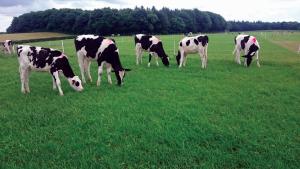Parasitic pneumonia, also known as hoose or husk, is an economically important disease in cattle caused by the lungworm Dictyocaulus viviparous.

Lungworm can result in severe financial losses due to loss of performance and fatalities in growing cattle and drop in milk yield and fatalities in lactating cows.
Outbreaks of parasitic pneumonia are usually observed from July to October with occasional outbreaks occurring either earlier in the summer or after October. Lungworm is still being diagnosed regularly in the AFBI veterinary laboratory postmortem rooms and given the relatively mild, wet weather conditions so far this autumn lungworm may be a risk for an extended period this year.
Lungworm infection is acquired by the ingestion of larvae from pasture and calves in their first grazing season, such as dairy calves and autumn born suckler calves, are most at risk of being affected. Animals exposed to infection develop a degree of immunity which provides a level of resistance to re-infection in previously exposed animals.
The persistence of this immunity is however dependent on further exposure, otherwise immunity tends to wane over time. Current long-acting anthelmintics, which are used to prevent or treat parasitic gastroenteritis are highly effective but can have the effect of reducing the exposure of young animals to low levels of lungworm infection, which is required to ensure the development of protective immunity. Cases of parasitic pneumonia are now commonly diagnosed by AFBI in older calves and in adult cattle in which immunity to lungworm has waned due to lack of exposure in the intervening period or in animals which were not exposed to lungworm in previous seasons.
Clinical signs of lungworm infection include respiratory signs, panting and harsh persistent cough. Growth rates may be affected. Severe infections result in difficulty in breathing and death. Faecal testing for lungworm larvae is also a useful diagnostic aid but negative results are possible, particularly in early infections.
Effective treatment options are available involving the administration of anthelmintic products. It is worth noting that infections can be diagnosed in housed animals that acquired the infection at grass before housing. Clinical signs may not be seen for three weeks following exposure.
Speak to your farm veterinarian for advice on herd management and treatment of affected animals.
Notes to editors:
AFBI is an arms-length body of DAERA delivering research and development, diagnostic and analytical testing, emergency response capability and expert scientific advice for DAERA and other government departments, public bodies and commercial companies in Northern Ireland, and further afield.
AFBI’s Vision is “Advancing the Local and Global Agri-Food Sectors Through Scientific Excellence”.
AFBI’s core areas:
- Leading improvements in the agri-food industry;
- Protecting animal, plant and human health;
- Enhancing the natural and marine environment.
Latest news
- AFBI issues Nematodirus warning – Spring 2025 11 April 2025
- Managing Nature Based Risks to the UK Economy and Opportunities for Green Finance 08 April 2025
- AFBI Hillsborough host AERA committee 27 March 2025
- The Omics Days Conference 27 March 2025
